EPICURUS (341271 B . C .) founded one of antiquitys most influential philosophical schools, which focused on the pursuit of happiness. Born on the Greek island of Samos, he operated the Garden, devoted to philosophy and communal living, outside of Athens.
GEORGE K . STRODACH (19051971) taught at Lafayette College, in Easton, Pennsylvaniafirst in the language department and then in the philosophy departmentfor more than thirty-five years.
The Art of Happiness
Translated with an Introduction
and Commentary by
GEORGE K . STRODACH
Foreword by
DANIEL KEEIN
PENGUIN BOOKS
PENGUIN BOOKS
Published by the Penguin Group
Penguin Group (USA) Inc., 375 Hudson Street, New York, New York 10014, USA Penguin Group (Canada), 90 Eglinton Avenue East, Suite 700, Toronto, Ontario M4P 2Y3, Canada (a division of Pearson Penguin Canada Inc.) Penguin Books Ltd, 80 Strand, London WC2R 0RL, England Penguin Ireland, 25 St Stephens Green, Dublin 2, Ireland (a division of Penguin Books Ltd) Penguin Group (Australia), 707 Collins Street, Melbourne, Victoria 3008, Australia (a division of Pearson Australia Group Pty Ltd) Penguin Books India Pvt Ltd, 11 Community Centre, Panchsheel Park, New Delhi 110 017, India Penguin Group (NZ), 67 Apollo Drive, Rosedale, Auckland 0632, New Zealand (a division of Pearson New Zealand Ltd) Penguin Books, Rosebank Office Park, 181 Jan Smuts Avenue, Parktown North 2193, South Africa Penguin China, B7 Jaiming Center, 27 East Third Ring Road North, Chaoyang District, Beijing 100020, China
Penguin Books Ltd, Registered Offices:
80 Strand, London WC2R 0RL, England
First published in the United States of America as The Philosophy of
Epicurus: Letters, Doctrines, and Parallel Passages from Lucretius
by Northwestern University Press 1963
This edition with a foreword by Daniel Klein published
in Penguin Books 2012
1 3 5 7 9 10 8 6 4 2
Foreword copyright Daniel Klein, 2012
All rights reserved
ISBN: 978-1-101-60865-4
Printed in the United States of America
Except in the United States of America, this book is sold subject to the condition that it shall not, by way of trade or otherwise, be lent, resold, hired out, or otherwise circulated without the publishers prior consent in any form of binding or cover other than that in which it is published and without a similar condition including this condition being imposed on the subsequent purchaser.
The scanning, uploading, and distribution of this book via the Internet or via any other means without the permission of the publisher is illegal and punishable by law. Please purchase only authorized electronic editions and do not participate in or encourage electronic piracy of copyrighted materials. Your support of the authors rights is appreciated.

Contents
Foreword
In Athens in the third century B.C. , everyday consciousness reached an unprecedented level of wonder. Athenian minds were animated with questions: What is the nature of the universe? What is real? How does man fit into the cosmos? What is a good life? What is a happy life? Are those twogood and happyin harmony or at odds with each other? And what role do the gods play in all this?
Philosophical discourse had become the gossip of the realm. Out on the south slope of the acropolis, where the Theater of Dionysius was producing a new comedy by Menander, the audience remained buzzing long after the play was over as they discussed the moral implications of the drama. Are extramarital affairs ever justifiable? Does bad behavior necessarily lead to personal unhappiness? Aristotles Nicomachean Ethics was invoked, as were the moral arguments of Plato.
Later, as members of the audience walked back through the agora, they may have encountered Zeno of Citium in the colonnade lecturing students on the tenets of stoicism, turned east and passed the Lyceum, where Aristotelian philosophy was being taught, then cut back toward the Academy, where Platonic philosophy was the subject at hand. And then, farther up a hill overlooking the metropolis, they would have reached a garden gate that bore these words:
Stranger, here you will do well to tarry; here our highest good is pleasure. The caretaker of that abode, a kindly host, will be ready for you; he will welcome you with bread, and serve you water also in abundance, with these words: Have you not been well entertained? This garden does not whet your appetite, but quenches it.
They had arrived at Epicuruss Garden, home of the Masters boarding school. Here, at the long outdoor table, nonstop philosophical discussion reached its zenith, and fine dining, as one can tell from the hosts offered menu, reached its nadir. (No pseudo-Epicurean foodies at this table.) Unlike at the Academy or the Lyceum, women, some of them concubines and mistresses, as well as a few slaves, joined the conversation; further, many of the students here had arrived without academic credentials in mathematics or music, de rigueur for entry to the other Athenian schools of higher learning. Everyone in the Garden radiated earnestness and good cheer. The subject under discussion was happiness.

Epicuruss notion of happiness has a decidedly Buddhist quality. Happiness is tranquility, and tranquility comes principally from putting aside worldly hankeringsambitions for power, status, involvement in government, the pursuit of voluptuous sensory experiences, and the accumulation of material goods. Two of Epicuruss most quoted maxims distill this idea: Not what we have, but what we enjoy, constitutes our abundance and, in its more admonitory form, Nothing is enough for the man to whom enough is too little.
Remarkably, Epicuruss ideas about ataraxiathe freedom from mental anguish and disturbance that is required for true happinesswere more directly influenced by Buddhist thought than a twenty-first-century reader might imagine for a Greek philosopher of that epoch. Two of Epicuruss early influences, Democritus and Pyrrho, had actually journeyed all the way to what is now India, where they had encountered Buddhism in the schools of the gymnosophists (naked teachers).
A parallel requirement for Epicurean happiness is freedom from fear of nature and from punitive gods. In his magnificent opus inspired by the philosophy of Epicurus, The Nature of Things, the Roman poet Lucretius reserved some of his highest praise for Epicuruss brave resistance to religious tradition and its superstitious interpretations of natural phenomena. Epicurus was among the first of his time to make such a clean and decisive break with what he considered religious hocus-pocus. Interestingly, in Epicuruss youth on the island of Samos, he often accompanied his mother, Chaerestrata, on her visits to peasants in her role as fortune-teller and faith healer. Apparently, Epicurus eventually saw more harm than benefit in his mothers occupation.
Epicurus defined happiness as the absence of pain, both physical and mental, and this raises some fascinating questions for the philosophically minded of every era. One could argue that the absence of pain brings a person up to only zero on the happiness scale; to push the meter into the positive zone, more is required, say a plate of roast lamb with all the trimmings. But Epicurus would shoot back that the pleasure of eating lamb has all kinds of future pains attached to it, like a bloated stomach or, worse in the long run, a hankering for more lamb or lamblike delicacies, putting a person back in the position of the perpetually frustrated individual for whom enough is always too little. These calculationswhich pleasures lead to future pain and which pains lead to future pleasurecomprised a good deal of the discussions around that table in Epicuruss Garden.

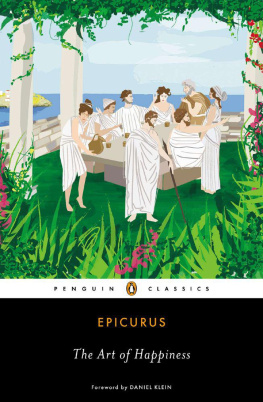

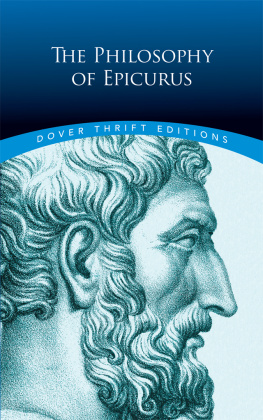


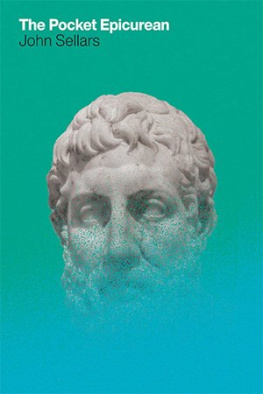
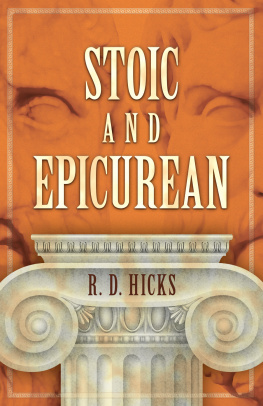
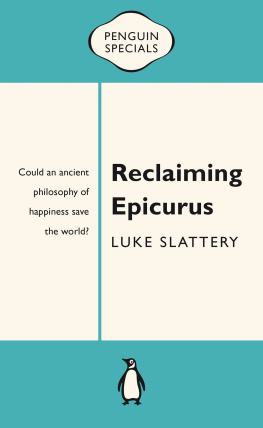

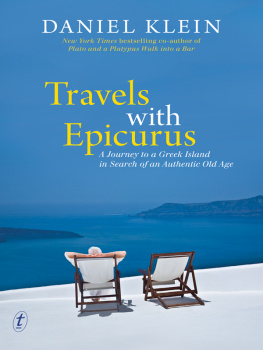
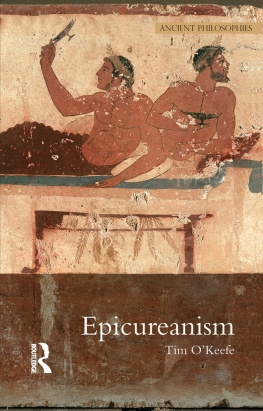

 CLASSICS
CLASSICS
